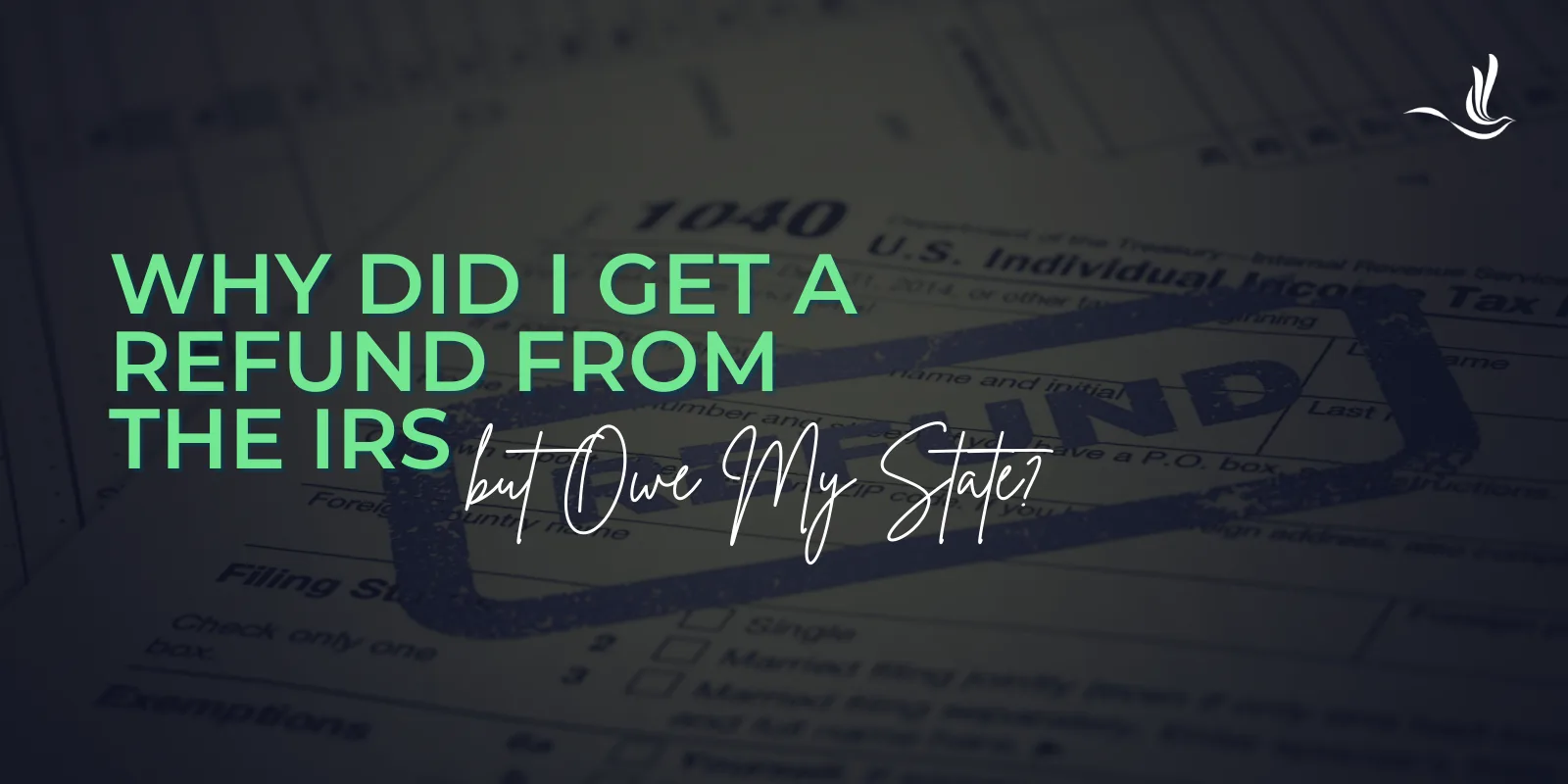Key Takeaways:
- Federal and state taxes are calculated separately, which can result in a refund from the IRS but a balance due to your state.
- Improper or insufficient state tax withholding is a leading reason people owe state taxes despite receiving a federal refund.
- States often disallow federal deductions or credits like HSAs or the Child Tax Credit, increasing your state tax bill.
- Freelancers and gig workers commonly overlook state estimated payments, which can trigger unexpected tax liabilities.
- Moving between states mid-year may create tax obligations in both, especially if you don’t update your withholding.
- You can prevent state tax surprises by reviewing both federal and state withholdings, especially after income or life changes.
It’s a situation many taxpayers find themselves in every year: they receive a refund from the IRS after filing their federal tax return, only to discover that they owe money to their state. This outcome can be both confusing and frustrating. After all, if you overpaid your taxes to the federal government, how is it possible that you still have a balance due at the state level? Understanding why you might get a refund from the IRS but owe your state begins with recognizing that federal and state taxes are two separate systems with different rules, rates, and requirements.
Understanding the Federal vs. State Tax Systems
Before exploring specific scenarios, it’s important to understand how federal and state taxes function independently. The IRS handles taxes at the national level, while your state’s Department of Revenue (or equivalent agency) governs state income taxes. These two entities often use different tax brackets, rules for deductions, and credit eligibility guidelines.
Separate Tax Authorities
The IRS collects federal income taxes based on standardized brackets and deductions, which apply to all U.S. taxpayers. States, on the other hand, each have their own tax codes. Some states use a flat tax rate, while others employ a progressive tax structure. A few states, like Florida and Texas, don’t tax income at all. This independence means your tax liability can differ significantly between the two systems.
For instance, if you live in California and work remotely for a company based in another state, you’ll still owe California state taxes on your income. This is even if the IRS refund suggests your overall withholding was sufficient. That’s because the IRS refund reflects only your federal situation, not your obligations under state law.
Different Filing Requirements and Calculations
Federal and state tax returns are filed separately, and they don’t always use the same definition of income. Some states require you to add back certain deductions or disallow others entirely. States may also have unique rules for reporting business income, capital gains, or unemployment benefits. These differences in income treatment can lead to a state tax bill even if you’re getting money back from the IRS.
For example, while federal law may exclude certain employer-sponsored benefits from income, your state may count them as taxable. If you claimed a student loan interest deduction on your federal return, your state may not allow it, raising your taxable income at the state level.
Common Reasons You Might Owe State Taxes Despite a Federal Refund
Now that you know the systems are separate, let’s explore why your results might not match. There are several common reasons you could receive a refund from the IRS but owe your state.
Differences in Tax Withholding
One of the most frequent causes of this mismatch is improper withholding. When you start a job, your employer asks you to fill out a federal W-4 form, which helps determine how much federal income tax to withhold from each paycheck. Some employers also collect state withholding information, often through a separate form. However, in many cases, state tax withholding isn’t set up correctly or at all.
If you work in a state that has income tax but didn’t submit the appropriate form, or you claimed too many exemptions, your employer may not have withheld enough. This leads to an underpayment that becomes a balance due when you file your return. Imagine a taxpayer who works in Illinois but lives in Indiana. If their employer withholds Illinois state taxes but the taxpayer files as an Indiana resident, they may not receive credit for those withholdings, or may owe Indiana more due to residency rules.
State Doesn’t Recognize Certain Federal Deductions or Credits
Many taxpayers are surprised to learn that deductions and credits allowed on their federal return don’t always apply at the state level. This can create a significant discrepancy in what you owe. For instance, if you contributed to a Health Savings Account (HSA), the federal government allows you to deduct that contribution. But in states like California and New Jersey, HSA contributions are not deductible. This means your taxable income is higher at the state level, resulting in more tax owed.
The same applies to federal tax credits such as the Earned Income Tax Credit or Child and Dependent Care Credit. Some states offer similar versions of these credits, but the amounts are often lower or not available at all. So, while these credits may help you get a federal refund, they don’t necessarily impact your state return the same way.
Self-Employment and Side Income
If you freelance, drive for a rideshare service, or run a small side business, you may be responsible for paying both federal and state income taxes on that income. Typically, self-employed individuals make estimated tax payments to the IRS, but many forget to make similar payments to their state.
Let’s say you’re a freelance graphic designer in New York. You diligently paid quarterly estimated taxes to the IRS, which results in a refund when you file your federal return. However, if you didn’t make estimated payments to New York State, you’ll likely owe when you file your state return. Worse, you may also be hit with penalties and interest for underpayment.
Moving Between States
Relocating from one state to another during the tax year can complicate your filing. Each state has its own rules for determining residency and how income earned during your time in the state should be taxed. In some cases, both states may claim you as a resident for the same period, leading to unexpected tax bills.
Suppose you moved from Arizona to Oregon in July. You may need to file part-year resident returns in both states. If Arizona withheld taxes during the first half of the year, but you didn’t adjust your withholding after moving, Oregon may not have collected enough tax during the second half. Even if you get a refund from the IRS, you might owe Oregon because the withholding wasn’t updated.
State Tax Law Changes or Expired Credits
State tax codes can change more frequently than federal ones, and sometimes those changes aren’t reflected in your withholding. A credit or deduction you qualified for last year may have expired or changed for the current tax year. For example, a state might sunset a property tax credit or change how retirement income is taxed. If you relied on those provisions to reduce your state tax in previous years, losing them could result in a balance due, even if everything else in your financial picture remained the same.
What You Can Do Moving Forward
Getting a refund from the IRS but owing your state may feel like a contradiction, but it often reflects issues that can be fixed with better tax planning. Here’s how to reduce the chances of this happening again.
Update Your W-4 and State Withholding
Start by reviewing your federal and state withholding elections. You can update your W-4 form to better match your federal tax situation, but don’t stop there. Most states also have their own withholding forms or systems, so be sure your employer is using the correct information for both. This is especially important if you’ve changed jobs, moved, or had a significant life event like marriage.
Track Freelance and Side Income More Closely
If you earn any self-employment or side income, estimate your total annual income and set aside funds for both federal and state taxes. Use tax software or consult with a professional to calculate your estimated payments accurately. Schedule quarterly payments to both the IRS and your state to avoid surprises at filing time.
Consult a Tax Professional
Taxes can get complicated quickly, especially if you live in one state and work in another, are self-employed, or had a major change in income. A tax professional can help you evaluate your full tax picture and adjust your withholding or estimated payments accordingly. They can also ensure you’re taking advantage of every available deduction and credit at both levels.
Frequently Asked Questions
Q: Why do I owe state but not federal taxes?
A: You may owe state taxes but not federal because each system uses different rules for deductions, credits, and income calculations. Insufficient state withholding or disallowed federal deductions at the state level are common causes.
Q: Is owing state taxes normal?
A: Yes, it’s common to owe state taxes, especially if your state withholding was too low or your state doesn’t follow all federal tax benefits.
Q: Can the IRS take your state refund if you owe them money?
A: No, the IRS cannot take your state tax refund directly, but your state may offset your refund to cover certain federal debts through the Treasury Offset Program.
Q: How do I stop my refund from being offset?
A: To stop a refund offset, resolve your outstanding debts in advance or request a review if you believe the debt is incorrect by contacting the agency listed in your offset notice.
State Tax Help in 2025
So, why did you get a refund from the IRS but owe your state? It’s usually not a mistake—it’s a result of how separate the two tax systems are. Federal refunds reflect your overpayment or credit eligibility at the national level. State balances due often stem from insufficient withholding, disallowed deductions, or differences in income treatment. Fortunately, once you understand how and why this happens, you can take action to prevent it in the future. Review your withholdings, track your income more carefully, and consider getting professional help if your financial situation is complex. Optima Tax Relief is the nation’s leading tax resolution firm with over $3 billion in resolved tax liabilities.
If You Need Tax Help, Contact Us Today for a Free Consultation
Publisher: Source link










